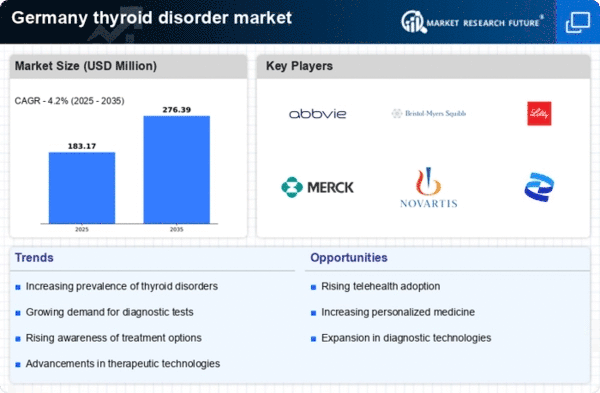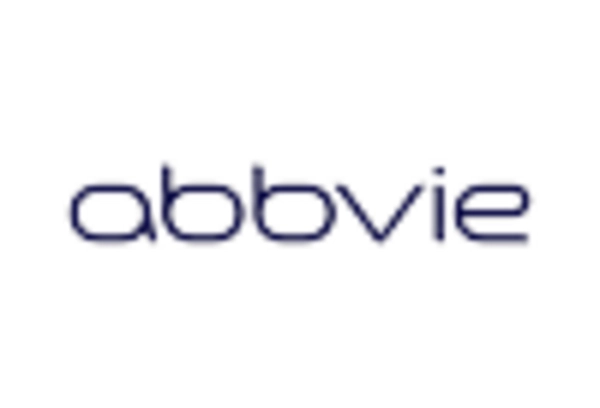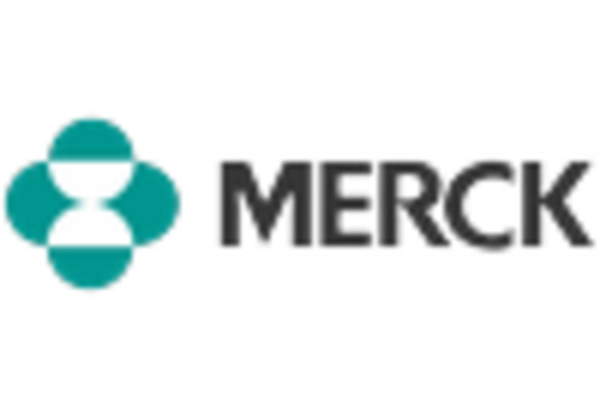Growing Role of Patient Advocacy Groups
Patient advocacy groups are playing a crucial role in shaping the thyroid disorder market in Germany. These organizations raise awareness about thyroid health, provide educational resources, and support patients in navigating their treatment options. Their efforts contribute to increased public knowledge about thyroid disorders, leading to earlier diagnoses and improved management. Additionally, these groups often collaborate with healthcare professionals and policymakers to influence healthcare practices and policies. As the influence of patient advocacy groups continues to grow, they are likely to drive demand for services and products within the thyroid disorder market, fostering a more informed patient population.
Rising Demand for Personalized Medicine
There is a notable shift towards personalized medicine in the thyroid disorder market, particularly in Germany. Patients are increasingly seeking tailored treatment plans that consider their unique genetic profiles and specific thyroid conditions. This trend is supported by advancements in genetic testing and biomarker identification, which allow for more precise diagnoses and targeted therapies. As healthcare providers embrace this approach, the thyroid disorder market is expected to grow, driven by the demand for individualized treatment strategies that enhance efficacy and minimize side effects. This evolution in patient care reflects a broader trend towards personalized healthcare solutions.
Increasing Prevalence of Thyroid Disorders
The thyroid disorder market in Germany is experiencing growth due to the rising prevalence of thyroid-related conditions. Recent data indicates that approximately 5 million individuals in Germany are affected by thyroid disorders, with hypothyroidism being the most common. This increasing incidence is likely to drive demand for diagnostic tests and treatment options, thereby expanding the thyroid disorder market. Furthermore, the aging population in Germany, which is more susceptible to thyroid issues, contributes to this trend. As awareness of thyroid health continues to grow, healthcare providers are expected to focus more on screening and early diagnosis, further propelling the thyroid disorder market.
Government Initiatives and Healthcare Policies
Government initiatives aimed at improving healthcare access and quality in Germany are positively influencing the thyroid disorder market. Policies that promote early detection and management of chronic diseases, including thyroid disorders, are being implemented. For instance, the German healthcare system has integrated preventive care measures, which include regular thyroid function tests for at-risk populations. This proactive approach is likely to enhance patient outcomes and increase the demand for thyroid-related healthcare services. Additionally, funding for research and development in the field of endocrinology may lead to innovative treatment options, thereby stimulating growth in the thyroid disorder market.
Technological Advancements in Treatment Options
The thyroid disorder market is benefiting from technological advancements in treatment options. Innovations such as minimally invasive surgical techniques and targeted therapies are becoming more prevalent in Germany. These advancements not only improve patient outcomes but also reduce recovery times, making treatment more appealing. The introduction of new medications, including biologics and personalized medicine, is also expected to enhance the management of thyroid disorders. As healthcare providers adopt these advanced treatment modalities, the thyroid disorder market is likely to expand, catering to a growing patient population seeking effective solutions.
















